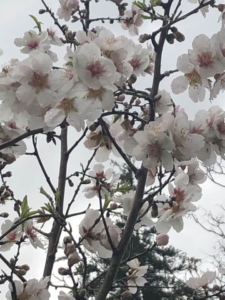“The Most Important Thing”
 I write to you from Jerusalem, where it is rainy and cold, but the almond trees are in full bloom. I’ve come at the invitation of Rabbi Shai Held of the Hadar Institute. Sixteen rabbis from across North America and from across the denominational streams have come for five days of study with Rabbi Yitz Greenberg, in celebration of his forthcoming book, The Triumph of Life. He has been developing the ideas contained in the book over decades. Yitz Greenberg, an Orthodox Rabbi, is best known for his risk-taking commitment to Jewish pluralism. Some of you may remember when he came to teach at Holy Blossom Temple in the late 1990s. No one has worked for Jewish unity – both theologically and practically — like Yitz. It’s been a gift to learn from him and the great minds who have been assembled for these few days.
I write to you from Jerusalem, where it is rainy and cold, but the almond trees are in full bloom. I’ve come at the invitation of Rabbi Shai Held of the Hadar Institute. Sixteen rabbis from across North America and from across the denominational streams have come for five days of study with Rabbi Yitz Greenberg, in celebration of his forthcoming book, The Triumph of Life. He has been developing the ideas contained in the book over decades. Yitz Greenberg, an Orthodox Rabbi, is best known for his risk-taking commitment to Jewish pluralism. Some of you may remember when he came to teach at Holy Blossom Temple in the late 1990s. No one has worked for Jewish unity – both theologically and practically — like Yitz. It’s been a gift to learn from him and the great minds who have been assembled for these few days.
While many North American groups are in Israel now for solidarity missions, this is not that. The war and the questions it raises about the Jewish future, about Israel’s place among the nations of the world, about the ethics of power certainly loom large in the backdrop of our study, but we have rarely discussed these themes directly. The theme of our studies and the theme of Rav Yitz’s book is about the Jewish commitment to life – ALL life.
In the coming weeks, I’ll have more to share from what I’ve learned in Jerusalem, but for now just this one teaching. The Talmud records a debate between Rabbi Akiva and Ben Azzai over which is the central verse of the Torah. I’ll tell you right up front, Akiva wins out. Jewish tradition favours Akiva’s assertion that the mitzvah to “love your neighbour as yourself” is the kernel around which all of Torah and all of Jewish life was built. The minority view, presented by Ben Azzai, is hardly remembered. But Rabbi Yitz Greenberg, who is not afraid to be an outlier for the sake of the truth, claims that Ben Azzai had it right all along. The fact that every human being is created “in the image of God” is the central truth around which all of Torah and all of Jewish life was built. Claiming this “klal gadol,” this foundational principle will, by definition, lead to loving your neighbour.
Rav Yitz believes that either path will lead to goodness. If you begin with your love of people, if you love your neighbour as yourself, you won’t be able to miss the fact that in each person is a spark of the Divine and this knowing will, in turn, lead you to love God. Similarly, if you begin with love of God, you won’t be able to help but fall in love with human beings, because they are “in the image of God”. The finest route to draw close to God is to draw close to your fellow human beings and to act lovingly towards them.
I’m not sure one always follows the other, but I appreciate Rabbi Greenberg’s optimism. I do believe that we increase our odds of finding a way to love God by practicing love for human beings and that we increase our chances of loving human beings by loving God. It is possible to have one without the other, but the striving for both is admirable and is exactly what Jewish life is designed to help us do. You can take up any mitzvah and see how this is true. When you light the Shabbat or Yom Tov candles, you can’t help but fall in love with the people around the table and you will thank God for them. When you volunteer for Out of the Cold and nourish the bodies and spirits of our vulnerable neighbours, your mitzvah is motivated by the fact that you cannot ignore that they, too, are created in the image of God.
After Shabbat, I will visit with some our former Shinshinim, with colleagues, friends, and family. I brought Canadian maple syrup to share with them as a sweet symbol of how much we Diaspora Jews are thinking of them and praying for their wellbeing.
Shabbat Shalom from Yerushalayim, the holy city.




